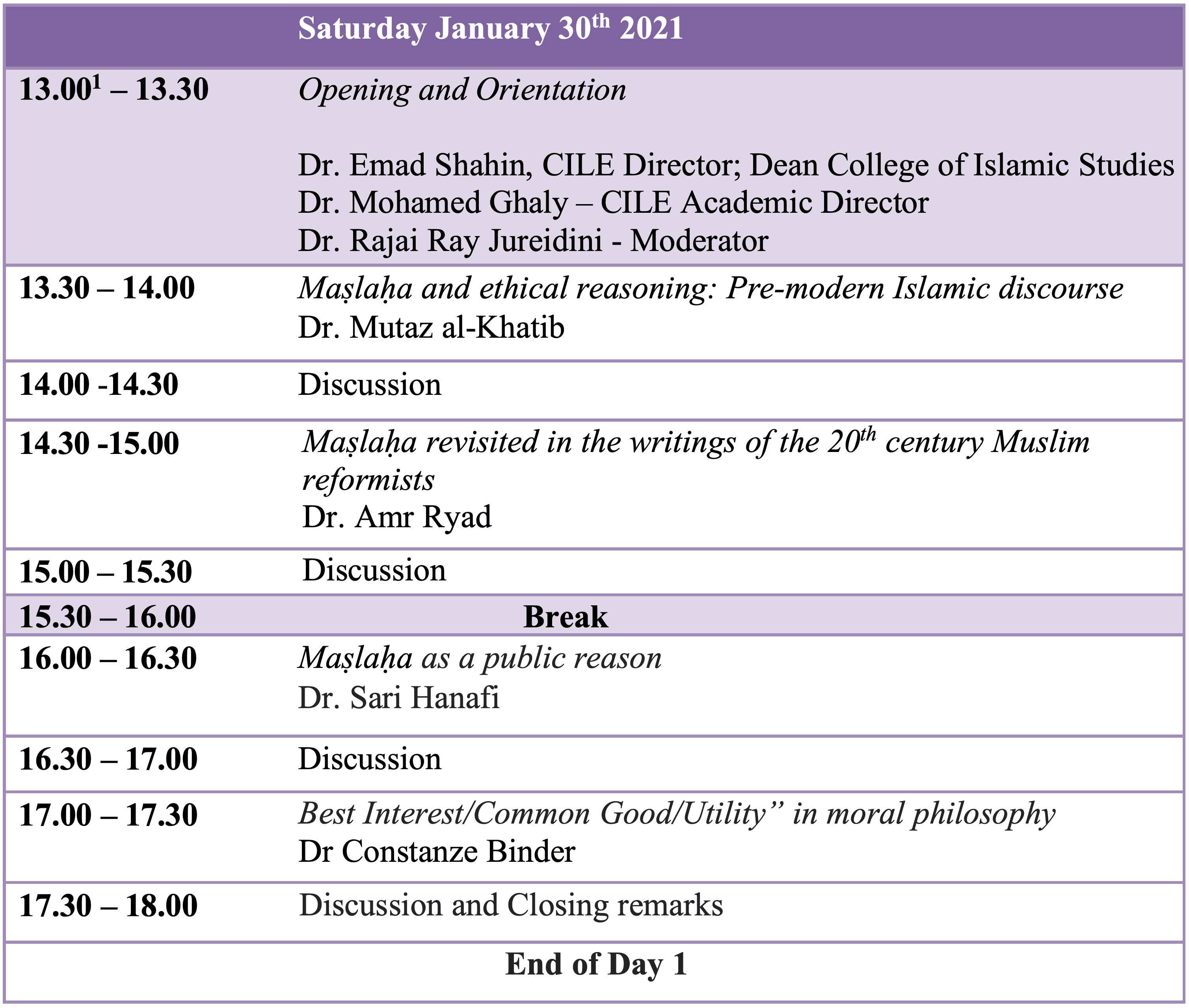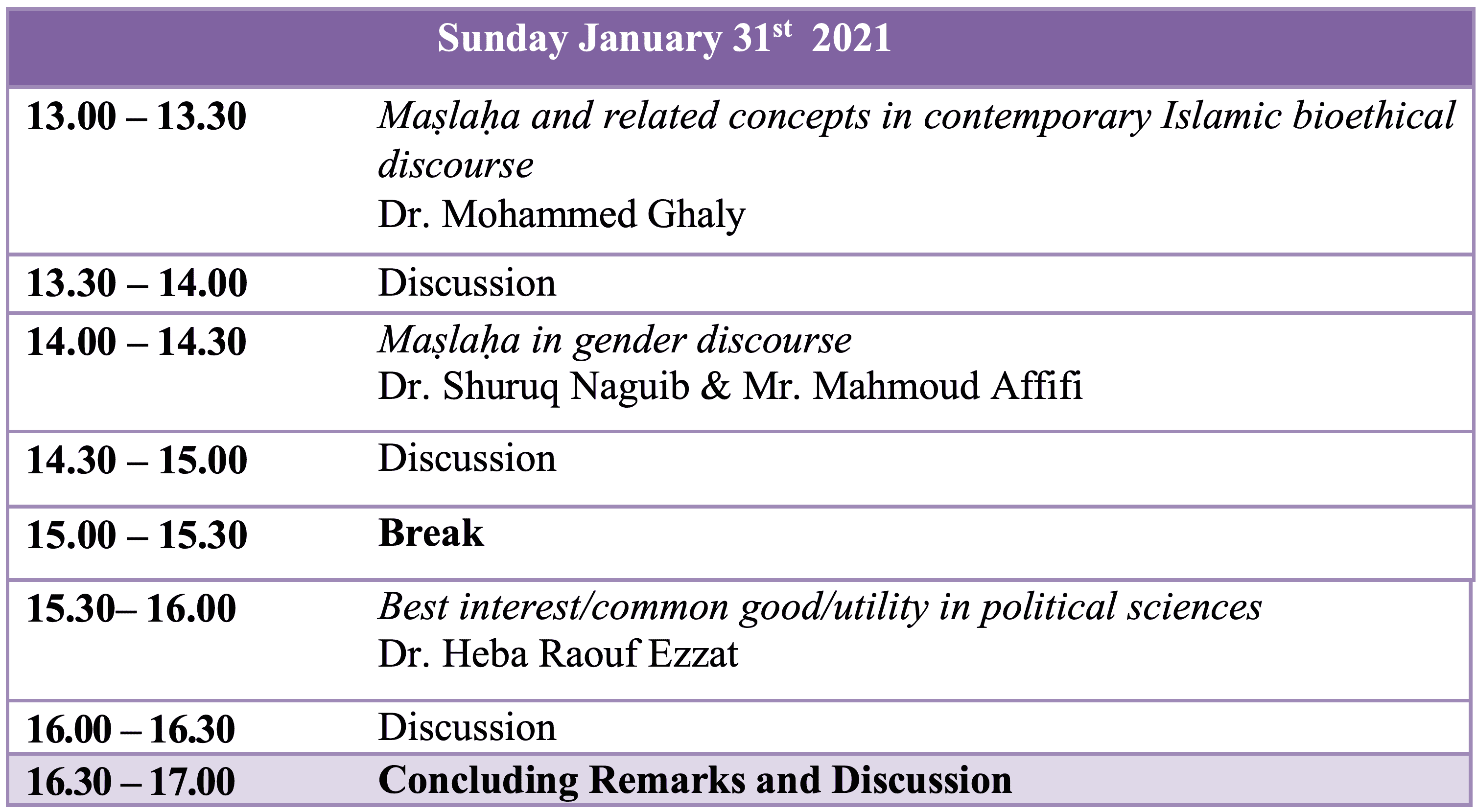
CILE Online Winter School
Maṣlaḥa (Benefit/Interest) as an Ethical Concept: Interdisciplinary Approaches
30-31 January 2021, Doha, Qatar
Open for Local and International Applicants
This is the second CILE Winter School, organized in collaboration with the University of Leuven, Belgium. It is a two-day intensive course meant to improve the knowledge of the prospective participants about one of the key concepts in the Islamic tradition, namely maṣlaḥa (lit. good/benefit) and how this concept contributes to both theoretical and applied ethical deliberations in the Islamic tradition.
Background
The reflections in this Winter School on the concept of maṣlaḥa are part of CILE’s broader and long-term interest in examining key concepts in the Islamic tradition and how they could/should contribute to the moral discourse on a wide range of issues concerned with ethical dilemmas. Within this framework, CILE has initiated earlier discussions on maṣlaḥa. For example, in 2015, CILE published a short interview with Dr. Muhammad Khalid Masud on:
The Concept of Maslaha and its Ethical Implications
Two years later (November 2017), CILE organized an Internal Seminar on:
Ethics & the Concept of Maslaha (Benefit/Interest): Towards a Comprehensive, Consistent, and Implementable Theory
CILE also organized a public lecture titled “What’s Maslaha? Who Decides? ” on 19 November 2017. In the same vein, CILE developed the theme of the moral significance of the concept of maqāṣid in CILE Granada Summer School 2017.
Teaching and Research
Key concepts like maṣlaḥa and maqāṣid and their contribution to the moral discourse also make part of our teaching- and research-related activities. As for teaching, there is the recently established M.A. program “Applied Islamic Ethics”, which takes place within the College of Islamic Studies, at Hamad Bin Khalifa University. As for research, CILE established the peer-reviewed Journal of Islamic Ethics and the book-series Studies in Islamic Ethics, both published by Brill in the Netherlands.
Participation Assignments
Accepted applicants will be given a Reader with all the reading materials. Each successful applicant is expected to prepare well for the Winter School, by going through these materials in advance and by engaging in interactive discussions throughout the course.
[Updated] Program (Doha Time GMT+3 Hours) and Teaching Team
Day 1: Saturday 30 January 2021

Day 2: Sunday 31 January 2021

- Dr. Mohammed Ghaly - Professor of Islam and Biomedical Ethics, CILE, Qatar
- Dr. Rajai Ray Jureidini - Professor of Migration, Human Rights and Ethics, CILE, Qatar
- Dr. Mutaz al-Khatib - Associate Professor of Methodology, CILE, Qatar
- Dr. Umar Ryad - Director of Leuven Center for the Study of Islam, Culture and Society (LCSICS), Belgium
- Dr. Sari Hanafi - Professor of Sociology, American University of Beirut, Lebanon
- Dr. Constanze Binder - Associate Professor of Philosophy, Erasmus Institute for Philosophy and Economics, Netherlands
- Dr. Shuruq Naguib - Associate Professor, Lancaster University, England
- Mr. Mahmoud Ali Gomas Affifi, doctoral candidate, Religious Studies, Lancaster University, England
- Dr. Heba Raouf Ezzat - Assistant Professor, Political Science, Ibn Haldun University, Istanbul, Turkey
Application, Deadline & Contacts
Please submit the following by 20 January 2021:
- (A) Short CV, and
- (B) A statement (max. 500 words) explaining your educational background, motivation for taking the Summer School, and how you think this activity can help you in your future plans.
Interested applicants must send the two documents to WinterSchool@cilecenter.org
>> Please note that only the applications received through this e-mail account will be considered.
If you have any questions about the Winter School, please contact:
- Dr. Rajai R. Jureidini (rjureidini@hbku.edu.qa)
- Dr. Umar Ryad (amr.ryad@kuleuven.be)
Organizers
- Research Center for Islamic Legislation & Ethics (CILE), College of Islamic Studies (CIS), Hamad Bin Khalifa University (HBKU)
Islamic Ethics is one of the emerging scholarly fields with promising growth potential in academic research and also with great appeal among the general public. The Research Center for Islamic Legislation and Ethics (CILE) has been contributing to this emerging field through various ways. Besides organizing international conferences and research seminars, CILE has also contributed to the field through pioneer academic initiatives. In collaboration with the renowned publisher Brill, CILE established the Journal of Islamic Ethics and the book-series Studies in Islamic Ethics. Additionally, the first-of-its-kind M.A. program “Applied Islamic Ethics” was inaugurated this academic year (2019-2020) in the College of Islamic Studies at Hamad Bin Khalifa University, to which CILE is affiliated. The program addresses how Islam, as a world religion with a rich moral tradition, engages with and contributes to the global moral discourse. Its strong interdisciplinary character combines in-depth knowledge of both theoretical and applied ethics rooted in the Islamic moral tradition.
- Leuven Centre for the Study of Islam Culture and Society (LCSICS)
KU Leuven was established in 1425 and is the oldest university in the Low Countries. Today, KU Leuven accommodates 50,000 students, spread across the various campuses in Leuven and elsewhere in Flanders. It ranks among the world’s top one hundred universities. Arabic and Islamic Studies is based at the Faculty of Arts, which hosts various research units and groups in cultures, history, literatures and languages. The Faculty of Arts is also the chair of the recently-established interfaculty Leuven Centre for the Study of Islam and Society (LCSICS) as part of the long-standing commitment of KU Leuven to the development of scholarship of Islam and Muslim societies. The Centre is an interdisciplinary crossroad for scholars and researchers at KU Leuven in various fields, including theology, religious studies, history, law, philosophy, philology, literature, anthropology, sociology, social and cultural psychology, cultural studies, and the arts. The new Centre is expected to play a leading role in the interdisciplinary and comparative study of Muslims, Muslim Societies, Muslim Communities in the diaspora, and Islam between and across the boundaries of traditional area studies programs on national and international levels.







![Embedded thumbnail for 01/2021 CILE Winter School: Maṣlaḥa (Benefit/Interest) as an Ethical Concept [Day 1/2]](/sites/default/files/styles/home_block_image/public/youtube/zZfV6lFcJbI.jpg?itok=GdTQyvpF)
![Embedded thumbnail for 01/2021 CILE Winter School: Maṣlaḥa (Benefit/Interest) as an Ethical Concept [Day 2/2]](/sites/default/files/styles/home_block_image/public/youtube/7dbfi3r-fxw.jpg?itok=C4FW9plF)












Add new comment